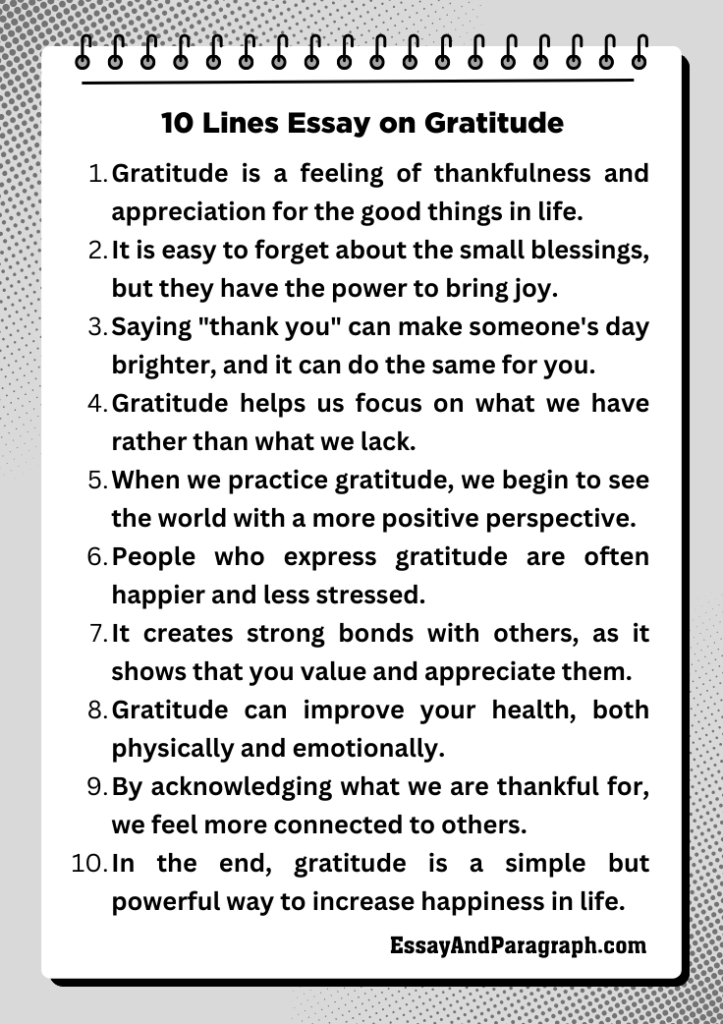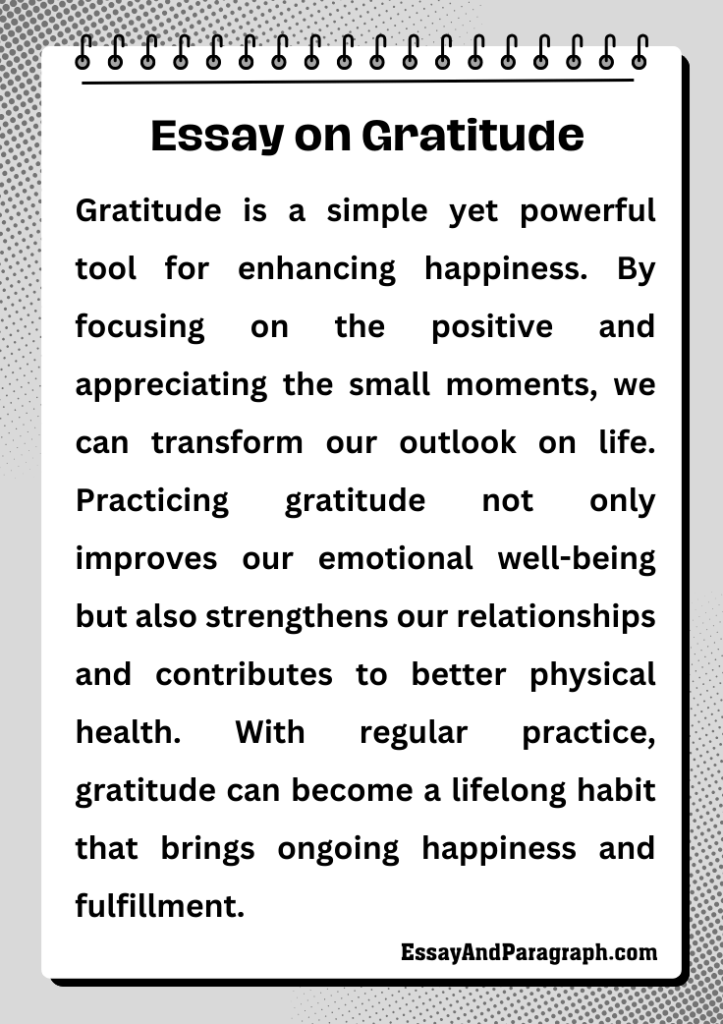Have you ever taken a moment to think about the simple act of saying “thank you”? It may sound small, but it has the power to change your entire outlook on life. Gratitude is a magical emotion that, when practiced regularly, can make us feel happier and more content with life. In this article, we will learn how gratitude is the key to happiness and why expressing it can bring joy to not just you, but to those around you too.
10 Lines Essay on Gratitude
Gratitude is a feeling of thankfulness and appreciation for the good things in life.
It is easy to forget about the small blessings, but they have the power to bring joy.
Saying “thank you” can make someone’s day brighter, and it can do the same for you.
Gratitude helps us focus on what we have rather than what we lack.
When we practice gratitude, we begin to see the world with a more positive perspective.
People who express gratitude are often happier and less stressed.
It creates strong bonds with others, as it shows that you value and appreciate them.
Gratitude can improve your health, both physically and emotionally.
By acknowledging what we are thankful for, we feel more connected to others.
In the end, gratitude is a simple but powerful way to increase happiness in life.

Short Essay on Gratitude: The Key to Happiness
Gratitude is a powerful emotion that can transform our lives. When we express gratitude, we show appreciation for the good things we have. Whether it’s for family, friends, or simple everyday moments, being thankful can bring happiness and peace of mind. Many people often focus on the things they don’t have, but practicing gratitude helps shift our attention to what we do have.
Research shows that people who practice gratitude are often happier, healthier, and more content with their lives. It also strengthens our relationships. A simple “thank you” can make someone feel appreciated, and that positivity can bounce back to us. Gratitude also has the power to reduce stress and anxiety. It encourages us to look for the positive side of any situation, even when things aren’t going as planned.
In the future, if we continue to practice gratitude, we can expect to lead happier and healthier lives. It’s a habit worth developing, not just for our own well-being, but for the benefit of those around us too.
Long Essay on Gratitude: The Key to Happiness
Gratitude is more than just saying “thank you.” It is an emotional state that brings contentment, peace, and happiness. When we are grateful, we focus on the positive aspects of life and appreciate the things we often take for granted. This simple shift in mindset can lead to remarkable changes in our overall well-being.
The key emotional response that gratitude triggers is happiness. When we express gratitude, it helps us see life from a different angle. Instead of focusing on what we don’t have, we start to appreciate the things that we do have. This shift in focus naturally boosts our mood and makes us feel happier. It’s a reminder that even in tough times, there is always something to be thankful for.
Gratitude often leads to small but meaningful actions. When we recognize the efforts of others, we strengthen our bonds with them. For example, saying thank you to a friend for their support or a family member for their care can make them feel valued. This leads to stronger relationships, which in turn make us happier.
Another significant outcome of practicing gratitude is improved health. Studies show that people who regularly practice gratitude report lower levels of stress and better overall health. Gratitude has been linked to better sleep quality, lower blood pressure, and improved immune function. It’s clear that being thankful doesn’t just lift your mood—it has a direct impact on your physical health as well.
Looking ahead, the more we practice gratitude, the more we will continue to reap its benefits. By making it a regular habit, we can develop a positive mindset that improves our happiness and well-being in the long run. So, take a moment today to reflect on the things you are grateful for—your family, your health, and the beautiful moments that make life worth living. You’ll be surprised by how much better you feel.
FAQs On Essay on Gratitude
1. What is gratitude and why is it important?
Gratitude is the feeling of being thankful for the good things in our lives. It is important because it helps us focus on the positive, rather than dwelling on what we lack. Practicing gratitude can boost our mood, improve our relationships, and even benefit our health. When we feel grateful, we experience more happiness and contentment.
2. How can I practice gratitude every day?
Practicing gratitude can be simple. You can start by keeping a gratitude journal where you write down three things you’re thankful for each day. It could be anything from the support of a friend to a beautiful sunset. Saying “thank you” to others, even for small things, can also be a great way to practice gratitude regularly.
3. How does gratitude affect our relationships?
Gratitude helps strengthen relationships by making others feel valued and appreciated. When we express gratitude, whether it’s thanking a friend or acknowledging someone’s help, it builds a sense of connection. This mutual appreciation deepens our bonds and creates more positive interactions with the people we care about.
4. Can gratitude improve my mental health?
Yes, gratitude has been shown to improve mental health by reducing stress and increasing feelings of happiness. Focusing on what we are thankful for helps shift our perspective from negativity to positivity. Regularly practicing gratitude can lower anxiety and depression, making us feel more balanced and content.
5. Is there any scientific evidence that gratitude increases happiness?
Yes, many scientific studies have shown that practicing gratitude can increase happiness. Research has found that people who keep gratitude journals or make it a daily habit experience higher levels of positive emotions, improved well-being, and even better physical health. This emotional boost is linked to the way gratitude encourages us to focus on the positive in our lives.
6. How can gratitude affect my physical health?
Gratitude can positively affect physical health by reducing stress, which is linked to a variety of health problems. People who practice gratitude report better sleep, lower blood pressure, and improved immune function. By fostering a positive mindset, gratitude can have a direct and powerful impact on both your mental and physical health.
Top 5 Quotes on Gratitude
“Gratitude turns what we have into enough.” — Aesop
“Gratitude is not only the greatest of virtues but the parent of all the others.” — Marcus Tullius Cicero
“When you practice gratefulness, there is a sense of respect toward others.” — Dalai Lama
“Gratitude is the sign of noble souls.” — Aesop
“Gratitude is the healthiest of all human emotions. The more you express gratitude for what you have, the more likely you will have even more to express gratitude for.” — Zig Ziglar
Summary
Gratitude is a simple yet powerful tool for enhancing happiness. By focusing on the positive and appreciating the small moments, we can transform our outlook on life. Practicing gratitude not only improves our emotional well-being but also strengthens our relationships and contributes to better physical health. With regular practice, gratitude can become a lifelong habit that brings ongoing happiness and fulfillment.




